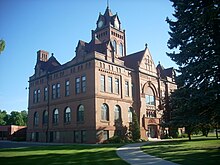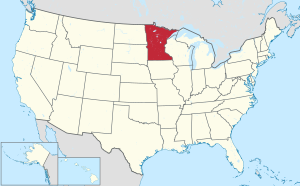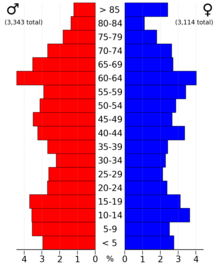Norman County, Minnesota: Difference between revisions
Tag: Reverted |
Undid revision 1262949776 by 67.53.178.51 (talk)Reverting unsourced changes |
||
| Line 202: | Line 202: | ||
==Government and politics== |
==Government and politics== |
||
From 1932 to 2012, Norman County voted Democratic, typically by large margins, in all but three elections, two were the nationwide Republican landslide victories of [[Dwight D. Eisenhower]] in 1952 and [[Richard Nixon]] in 1972, and the third was in 2000, when strong third party showings in the state helped swing the county to [[George W. Bush]]. The 2016 election, however, saw the county swing significantly to the right, as [[Donald Trump]] won the county by over 13%. He increased his margin of victory in 2020 to nearly 16% and |
From 1932 to 2012, Norman County voted Democratic, typically by large margins, in all but three elections, two were the nationwide Republican landslide victories of [[Dwight D. Eisenhower]] in 1952 and [[Richard Nixon]] in 1972, and the third was in 2000, when strong third party showings in the state helped swing the county to [[George W. Bush]]. The 2016 election, however, saw the county swing significantly to the right, as [[Donald Trump]] won the county by over 13%. He increased his margin of victory in 2020 to nearly 16%, and turned in the best performance for a Republican in Norman County since [[Herbert Hoover]] in 1928. |
||
{{PresHead|place=Norman County, Minnesota|whig=no|source1=<ref>{{Cite web |last=Leip |first=David |title=Atlas of US Presidential Elections |url=http://uselectionatlas.org/RESULTS |access-date=October 10, 2018 |website=uselectionatlas.org}}</ref>}} |
{{PresHead|place=Norman County, Minnesota|whig=no|source1=<ref>{{Cite web |last=Leip |first=David |title=Atlas of US Presidential Elections |url=http://uselectionatlas.org/RESULTS |access-date=October 10, 2018 |website=uselectionatlas.org}}</ref>}} |
||
<!-- PresRow should be {{PresRow|Year|Winning party|GOP/Whig vote #|Dem vote #|3rd party vote #|State}} --> |
<!-- PresRow should be {{PresRow|Year|Winning party|GOP/Whig vote #|Dem vote #|3rd party vote #|State}} --> |
||
Latest revision as of 15:07, 30 December 2024
Norman County | |
|---|---|
 Norman County Courthouse in Ada, Minnesota | |
 Location within the U.S. state of Minnesota | |
 Minnesota's location within the U.S. | |
| Coordinates: 47°20′N 96°28′W / 47.33°N 96.46°W | |
| Country | |
| State | |
| Founded | February 17, 1881[1] |
| Named for | Norwegian settlers |
| Seat | Ada |
| Largest city | Ada |
| Area | |
• Total | 877 sq mi (2,270 km2) |
| • Land | 873 sq mi (2,260 km2) |
| • Water | 3.9 sq mi (10 km2) 0.4% |
| Population (2020) | |
• Total | 6,441 |
• Estimate (2023) | 6,329 |
| • Density | 7.4/sq mi (2.9/km2) |
| Time zone | UTC−6 (Central) |
| • Summer (DST) | UTC−5 (CDT) |
| Congressional district | 7th |
| Website | www |
Norman County is a county in the northwestern part of the U.S. state of Minnesota. As of the 2020 census, the population was 6,441.[2] Its county seat is Ada.[3] The county is in Minnesota's Red River Valley region.
History
[edit]Norwegians started settling in Norman County in the early 1870s and up until Dec. 27th, 1906 that also included what is now Mahnomen County (Ojibwe for "wild rice"). The county was created by the Minnesota legislature on March 17, 1881, with Ada (which had been founded in 1874) as county seat. Even though Twin Valley was much closer to the geographic center of the county Ada was chosen as the county seat, sparking a 6 year legal battle.[4]
It was named in recognition of the many settlers who came from Scandinavian countries, especially Norway.[5] Another source posits that it was named for Norman Kittson, an early historical figure of the region.[6]
Geography
[edit]Norman County lies on Minnesota's western border, abutting North Dakota across the Red River, which flows north along (and defines) the county's west line. The Wild Rice River flows west through the lower part of the county, discharging into the Red slightly north of the county's southwest corner. The Marsh River rises in central Norman County and flows northwest into the Red near the county's northwest corner. The county terrain consists of low rolling hills, carved by drainages and lightly dotted with lakes and swampy areas. The terrain is devoted to agriculture.[7] The terrain slopes to the north and west with its highest point near its southeast corner, at 1,224 ft (373 m) ASL.[8] The county has an area of 877 square miles (2,270 km2), of which 873 square miles (2,260 km2) is land and 3.9 square miles (10 km2) (0.4%) water.[9] Flom Township contains a prominent, irregular hill of morainic drift known as Frenchman's Bluff. It rises 150 ft (46 m) above the shoreline of the former Lake Agassis, three miles (4.8 km) to the northwest.[5]

Major highways
[edit]Adjacent counties
[edit]- Polk County - north
- Mahnomen County - east
- Becker County - southeast
- Clay County - south
- Cass County, North Dakota - southwest
- Traill County, North Dakota - west
- Agassiz Dunes Scientific and Natural Area (part)
- Agassiz No. 1 State Wildlife Management Area
- Agassiz No. 2 State Wildlife Management Area
- Dalby State Wildlife Management Area
- Faith State Wildlife Management Area
- Home Lake State Wildlife Management Area
- Moccasin State Wildlife Management Area
- Neal State Wildlife Management Area
- Prairie Smoke Dunes Scientific and Natural Area
- Sandpiper Scientific and Natural Area
- Santee Prairie Scientific and Natural Area
- Syre State Wildlife Management Area
- Twin Valley Prairie Scientific and Natural Area
- Twin Valley State Wildlife Management Area
- Vangsness State Wildlife Management Area
- Home Lake
- Lockhart Swamp
Demographics
[edit]| Census | Pop. | Note | %± |
|---|---|---|---|
| 1890 | 10,618 | — | |
| 1900 | 15,045 | 41.7% | |
| 1910 | 13,446 | −10.6% | |
| 1920 | 14,880 | 10.7% | |
| 1930 | 14,061 | −5.5% | |
| 1940 | 14,746 | 4.9% | |
| 1950 | 12,909 | −12.5% | |
| 1960 | 11,253 | −12.8% | |
| 1970 | 10,008 | −11.1% | |
| 1980 | 9,379 | −6.3% | |
| 1990 | 7,975 | −15.0% | |
| 2000 | 7,442 | −6.7% | |
| 2010 | 6,852 | −7.9% | |
| 2020 | 6,441 | −6.0% | |
| 2023 (est.) | 6,329 | [11] | −1.7% |
| U.S. Decennial Census[12] 1790-1960[13] 1900-1990[14] 1990-2000[15] 2010-2020[2] | |||
2020 Census
[edit]| Race | Num. | Perc. |
|---|---|---|
| White (NH) | 5,702 | 88.52% |
| Black or African American (NH) | 17 | 0.3% |
| Native American (NH) | 115 | 1.8% |
| Asian (NH) | 18 | 0.3% |
| Pacific Islander (NH) | 0 | 0% |
| Other/Mixed (NH) | 301 | 4.7% |
| Hispanic or Latino | 288 | 4.5% |
2000 census
[edit]
As of the census of 2000, there were 7,442 people, 3,010 households, and 2,007 families in the county. The population density was 8.52 per square mile (3.29/km2). There were 3,455 housing units at an average density of 3.96 per square mile (1.53/km2). The racial makeup of the county was 95.30% White, 0.11% Black or African American, 1.73% Native American, 0.31% Asian, 1.13% from other races, and 1.42% from two or more races. 3.05% of the population were Hispanic or Latino of any race. 57.5% were of Norwegian and 21.7% German ancestry.
There were 3,010 households, out of which 30.10% had children under the age of 18 living with them, 57.80% were married couples living together, 5.90% had a female householder with no husband present, and 33.30% were non-families. 31.30% of all households were made up of individuals, and 17.00% had someone living alone who was 65 years of age or older. The average household size was 2.41 and the average family size was 3.04.
The county population contained 25.70% under the age of 18, 6.20% from 18 to 24, 24.10% from 25 to 44, 23.00% from 45 to 64, and 20.90% of over age 64. The median age was 41 years. For every 100 females there were 98.60 males. For every 100 females age 18 and over, there were 96.80 males.
The median income for a household in the county was $32,535, and the median income for a family was $41,280. Males had a median income of $28,674 versus $20,619 for females. The per capita income for the county was $15,895. About 7.10% of families and 10.30% of the population were below the poverty line, including 10.70% of those under age 18 and 14.30% of those age 65 or over.
Communities
[edit]Cities
[edit]Unincorporated communities
[edit]Townships
[edit]- Anthony Township
- Bear Park Township
- Flom Township
- Fossum Township
- Good Hope Township
- Green Meadow Township
- Halstad Township
- Hegne Township
- Hendrum Township
- Home Lake Township
- Lake Ida Township
- Lee Township
- Lockhart Township
- Mary Township
- McDonaldsville Township
- Pleasant View Township
- Rockwell Township
- Shelly Township
- Spring Creek Township
- Strand Township
- Sundal Township
- Waukon Township
- Wild Rice Township
- Winchester Township
Government and politics
[edit]From 1932 to 2012, Norman County voted Democratic, typically by large margins, in all but three elections, two were the nationwide Republican landslide victories of Dwight D. Eisenhower in 1952 and Richard Nixon in 1972, and the third was in 2000, when strong third party showings in the state helped swing the county to George W. Bush. The 2016 election, however, saw the county swing significantly to the right, as Donald Trump won the county by over 13%. He increased his margin of victory in 2020 to nearly 16%, and turned in the best performance for a Republican in Norman County since Herbert Hoover in 1928.
| Year | Republican | Democratic | Third party(ies) | |||
|---|---|---|---|---|---|---|
| No. | % | No. | % | No. | % | |
| 2024 | 1,963 | 59.59% | 1,233 | 37.43% | 98 | 2.98% |
| 2020 | 1,953 | 56.76% | 1,404 | 40.80% | 84 | 2.44% |
| 2016 | 1,699 | 52.10% | 1,264 | 38.76% | 298 | 9.14% |
| 2012 | 1,384 | 43.16% | 1,730 | 53.94% | 93 | 2.90% |
| 2008 | 1,204 | 35.06% | 2,129 | 62.00% | 101 | 2.94% |
| 2004 | 1,794 | 47.09% | 1,954 | 51.29% | 62 | 1.63% |
| 2000 | 1,808 | 49.66% | 1,575 | 43.26% | 258 | 7.09% |
| 1996 | 1,392 | 37.40% | 1,875 | 50.38% | 455 | 12.22% |
| 1992 | 1,541 | 37.39% | 1,784 | 43.29% | 796 | 19.32% |
| 1988 | 1,789 | 45.22% | 2,149 | 54.32% | 18 | 0.46% |
| 1984 | 2,152 | 49.17% | 2,202 | 50.31% | 23 | 0.53% |
| 1980 | 2,192 | 44.92% | 2,253 | 46.17% | 435 | 8.91% |
| 1976 | 1,983 | 39.57% | 2,946 | 58.78% | 83 | 1.66% |
| 1972 | 2,536 | 50.51% | 2,444 | 48.68% | 41 | 0.82% |
| 1968 | 1,981 | 39.53% | 2,828 | 56.42% | 203 | 4.05% |
| 1964 | 1,662 | 31.35% | 3,631 | 68.50% | 8 | 0.15% |
| 1960 | 2,642 | 47.30% | 2,932 | 52.49% | 12 | 0.21% |
| 1956 | 2,338 | 46.01% | 2,740 | 53.93% | 3 | 0.06% |
| 1952 | 3,069 | 55.07% | 2,465 | 44.23% | 39 | 0.70% |
| 1948 | 1,695 | 32.87% | 3,245 | 62.92% | 217 | 4.21% |
| 1944 | 1,884 | 39.51% | 2,846 | 59.69% | 38 | 0.80% |
| 1940 | 2,161 | 36.53% | 3,716 | 62.81% | 39 | 0.66% |
| 1936 | 1,570 | 28.54% | 3,778 | 68.67% | 154 | 2.80% |
| 1932 | 1,313 | 25.09% | 3,601 | 68.80% | 320 | 6.11% |
| 1928 | 3,308 | 67.39% | 1,401 | 28.54% | 200 | 4.07% |
| 1924 | 1,997 | 45.77% | 171 | 3.92% | 2,195 | 50.31% |
| 1920 | 3,451 | 74.17% | 481 | 10.34% | 721 | 15.50% |
| 1916 | 1,046 | 42.11% | 1,076 | 43.32% | 362 | 14.57% |
| 1912 | 329 | 14.74% | 510 | 22.85% | 1,393 | 62.41% |
| 1908 | 1,276 | 55.26% | 661 | 28.63% | 372 | 16.11% |
| 1904 | 1,782 | 78.02% | 161 | 7.05% | 341 | 14.93% |
| 1900 | 1,492 | 53.57% | 964 | 34.61% | 329 | 11.81% |
| 1896 | 1,382 | 49.61% | 1,304 | 46.81% | 100 | 3.59% |
| 1892 | 724 | 38.97% | 294 | 15.82% | 840 | 45.21% |
| Position | Name | District | |
|---|---|---|---|
| Commissioner | Marvin Gunderson | District 1 | |
| Commissioner | Jesse Lee | District 2 | |
| Commissioner | Steve Jacobson | District 3 | |
| Commissioner and Chairperson | Lee Ann Hall | District 4 | |
| Commissioner | Steve Bommersbach | District 5 | |
| Position | Name | Affiliation | District | |
|---|---|---|---|---|
| Senate | Mark Johnson | Republican | District 1 | |
| House of Representatives | Deb Kiel | Republican | District 1B | |
| Position | Name | Affiliation | District | |
|---|---|---|---|---|
| House of Representatives | Michelle Fischbach | Republican | 7th | |
| Senate | Amy Klobuchar[19] | Democrat | N/A | |
| Senate | Tina Smith[20] | Democrat | N/A | |
See also
[edit]References
[edit]- ^ "Minnesota Place Names". Minnesota Historical Society. Archived from the original on June 20, 2012. Retrieved March 18, 2014.
- ^ a b "State & County QuickFacts". United States Census Bureau. Retrieved April 10, 2023.
- ^ "Find a County". National Association of Counties. Retrieved June 7, 2011.
- ^ Johnson, Lenora (1976). Under Prairie Skies. pp. 47–48.
- ^ a b Upham, Warren (1920). Minnesota Geographic Names: Their Origin and Historic Significance. Minnesota Historical Society. pp. 381–384.
- ^ Gannett, Henry (1905). The Origin of Certain Place Names in the United States. Government Printing Office. p. 177.
Norman County named after Norman Kittson.
- ^ a b c d e f Norman County MN Google Maps (accessed April 17, 2019)
- ^ ""Find an Altitude/Norman County MN" Google Maps (accessed April 17, 2019)". Archived from the original on May 21, 2019. Retrieved April 17, 2019.
- ^ "2010 Census Gazetteer Files". United States Census Bureau. August 22, 2012. Archived from the original on September 21, 2013. Retrieved October 24, 2014.
- ^ Nelson, Steven (2011). Savanna Soils of Minnesota. Minnesota: Self. pp. 57-60. ISBN 978-0-615-50320-2.
- ^ "Annual Estimates of the Resident Population for Counties: April 1, 2020 to July 1, 2023". Retrieved March 18, 2024.
- ^ "U.S. Decennial Census". United States Census Bureau. Retrieved October 24, 2014.
- ^ "Historical Census Browser". University of Virginia Library. Retrieved October 24, 2014.
- ^ "Population of Counties by Decennial Census: 1900 to 1990". United States Census Bureau. Retrieved October 24, 2014.
- ^ "Census 2000 PHC-T-4. Ranking Tables for Counties: 1990 and 2000" (PDF). United States Census Bureau. Archived (PDF) from the original on March 27, 2010. Retrieved October 24, 2014.
- ^ "P2 HISPANIC OR LATINO, AND NOT HISPANIC OR LATINO BY RACE – 2020: DEC Redistricting Data (PL 94-171) – Norman County, Minnesota".
- ^ Leip, David. "Atlas of US Presidential Elections". uselectionatlas.org. Retrieved October 10, 2018.
- ^ "Norman County". www.co.norman.mn.us. Retrieved April 25, 2023.
- ^ "U.S. Senator Amy Klobuchar". www.klobuchar.senate.gov. Retrieved June 24, 2020.
- ^ "Home". Senator Tina Smith. Retrieved June 24, 2020.

